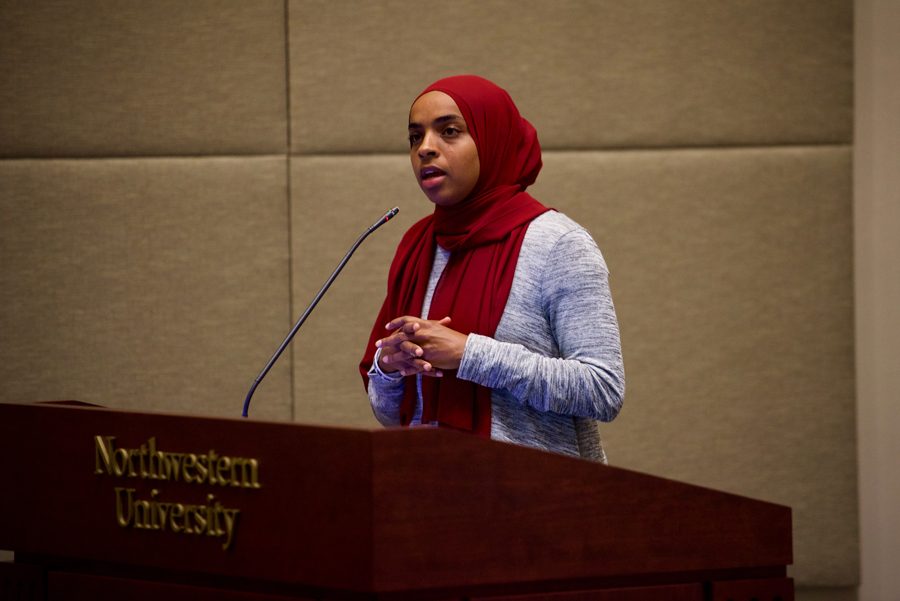Muslim basketball player speaks on faith, discrimination during Discover Islam Week event
Brian Meng/The Daily Northwestern
Bilqis Abdul-Qaadir speaks as part of Discover Islam Week. Abdul-Qaadir, the founder of the “Muslim Girls Hoop Too” campaign, was prohibited from playing basketball internationally for wearing a hijab.
February 22, 2018
For 24 years, basketball was Bilqis Abdul-Qaadir’s entire life.
She broke both the male and female state scoring records at her Springfield, Massachusetts, high school. As the first Muslim woman to play in the NCAA while wearing a hijab, she played for both the University of Memphis and Indiana State University, helping the latter win the Missouri Valley Conference regular season title.
When basketball was taken away from her, Abdul-Qaadir said she was stripped of part of her identity. And her career didn’t end due to injury or age — Abdul-Qaadir said she had to give up basketball due to discrimination.
“To this day, it’s hard,” she said. “They did rob me of a career.”
The Muslim-cultural Students Association hosted Abdul-Qaadir for a talk and screening of the documentary “Life Without Basketball” on Wednesday at the Rebecca Crown Center. Abdul-Qaadir discussed her Muslim faith and her journey from athlete to activist as part of McSA’s Discover Islam Week.
After college, Abdul-Qaadir was set to play in Europe in the International Basketball Federation (FIBA), she said. However, she said she was informed that FIBA had a policy stating that headgear above five inches was prohibited in league play. Her hijab was regarded as dangerous and a safety hazard, she said.
Previously, she said she was known as “that Muslim hooper.” Without basketball, she was simply Muslim, and she had to decide what that meant for her.
“Basketball was my test of faith,” Abdul-Qaadir said.
In college, she said she found it hard to keep up with her faith while surrounded by mostly non-Muslims. She prayed “with no feeling” and barely read the Quran, she said.
Abdul-Qaadir said she considered taking her hijab off for games in order to continue her career. Feeling unsure of how to proceed, she decided to turn to prayer. Kneeling down, she began to cry and had a revelation.
“I physically felt something change in my heart,” she said. “(I realized) this is bigger than (me) and this is bigger than basketball.”
Reinvested in her faith, Abdul-Qaadir said she advocated for a rule change and inspired young Muslim girls. She began speaking around the country and started “Muslim Girls Hoop Too,” a movement to raise awareness about the difficulties she faced.
In addition, Abdul-Qaadir founded “Dribbling Down Barriers,” a basketball camp and clinic for Muslim girls. She said as a player, she would often be given “stares and glares,” and on one occasion she was even tackled by an opposing player at the instruction of a coach. By encouraging Muslims girls to play basketball, she said she hopes they can walk into arenas and not be viewed as an abnormality.
McSA secretary Saadia Elahi told The Daily that Muslim women are often perceived negatively for having ambition. Abdul-Qaadir’s speech showed Muslims and non-Muslims alike that Muslim women can and do follow their dreams while retaining their spiritual identity, she said.
“This speaker especially meant a lot to me, because hearing about a woman pursuing her passions without letting anybody get in the way of her faith in that process is just really important for young Muslim women to hear,” Elahi said.
In May 2017, after years of petitioning, FIBA rescinded the hijab rule. Earlier this month, Abdul-Qaadir made a triumphant return to basketball, playing for Somalia in the Arab Women’s Sports Tournament in Dubai and averaging 30 points per game, she said.
Abdul-Qaadir said the return was especially sweet because she played in a Muslim country. She said she has received invitations to play in more international tournaments and is still considering them. However, Abdul-Qaadir said she’s enjoying speaking about her journey and coaching basketball in the meantime.
McSA’s ASG Senator, Ahmad Keshk, told The Daily that Abdul-Qaadir’s talk moved him and was important in bringing Muslim representation to Northwestern students who may not otherwise hear such stories.
“Bilqis has a way of connecting with every different person, whether you’re a female athlete or a female Muslim,” Keshk said. “She’s able to connect with different people and really just inspire.”
Email: [email protected]
Twitter: @birenBOMB


